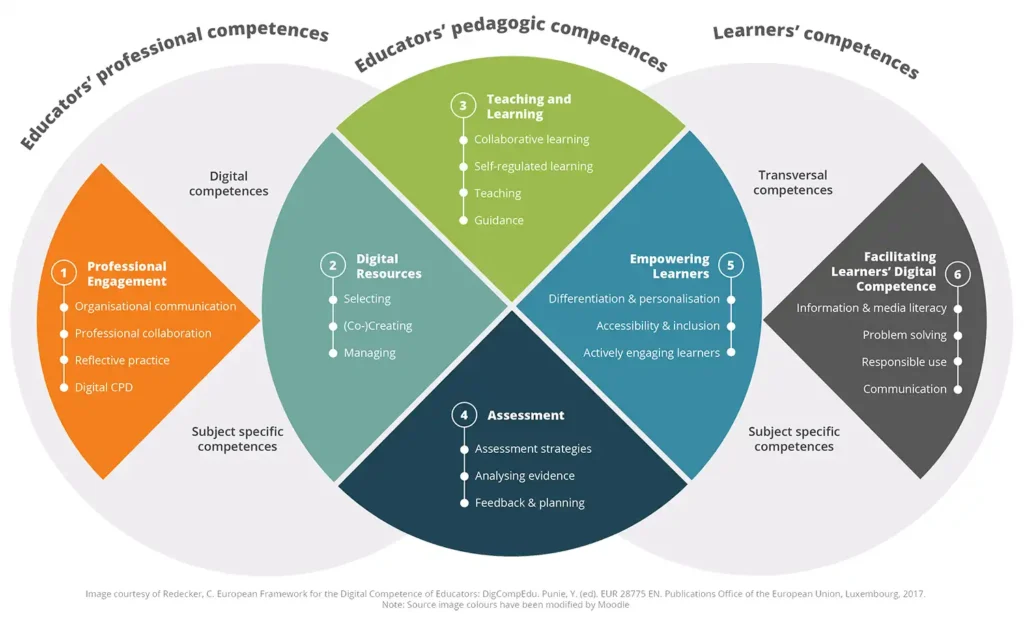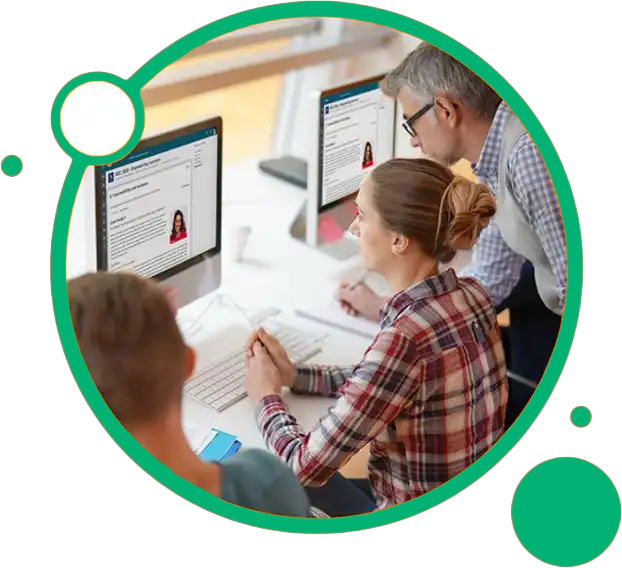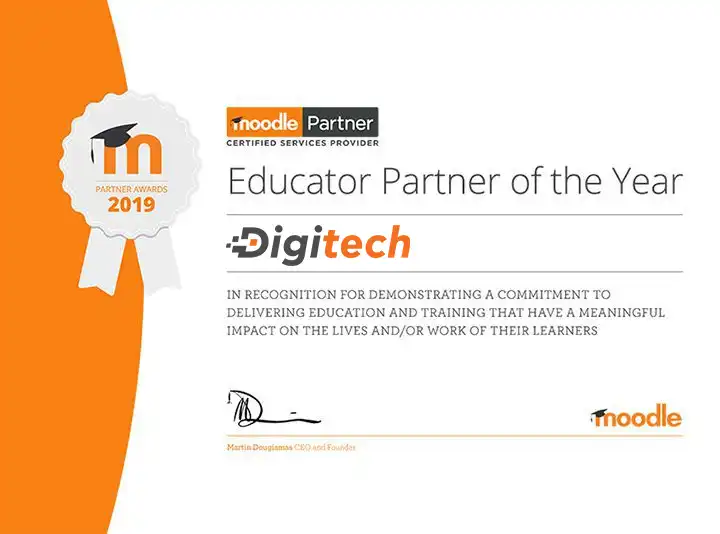
Certified MEQ Training
MEQ: Moodle Educator Qualification
The MEQ (Moodle Educator Qualification) Preparation Program is offered exclusively by certified Moodle Partners worldwide, and through this program trainers can also obtain official Moodle trainer certification.

The training program covers all 22 Competences as defined by the European Commission’s Digital Competence Framework for Educators (DigCompEdu) and is structured around six courses: Professional Engagement, Digital Resources, Teaching and Learning, Assessment, Empowering Learners, Facilitating Learners’ Digital Competence.
The program was significantly revised recently, including new content on Artificial Intelligence (AI) and its impact on education.
The course content is currently available in English, with videos subtitled in Greek. B2-level English proficiency is sufficient. Communication with facilitators and assignment submission can be in Greek or English.

Who is it for?
The MEQ preparation program is aimed at education professionals who use—or wish to use—Moodle as part of their teaching practice.
Beyond primary, secondary, or tertiary educators, the MEQ preparation programs equally address adult trainers, Moodle course creators seeking solid pedagogical foundations, and Learning & Development professionals in enterprises.
The training content is provided in English with Greek-subtitled videos. Communication with trainers and assignment submission can be in Greek or English; B2 is the recommended English level.
The program is specifically designed to meet the needs of both new and experienced Moodlers.


Moodle Educator Partner of 2019
Digitech attended the first #MootGlobal19 in Barcelona, where it was recognized by Moodle HQ as “Educator Partner of the Year” for the training services delivered through WIDE Training Academy (www.widetraining.gr)
MEQ Program Courses
The MEQ preparation program is designed around the 22 DigCompEdu digital competences, adapted to the Moodle environment.
All six MEQ preparation courses are delivered online and asynchronously. Each course includes a quiz for each competence assessed, and two written assignments giving candidates the opportunity to reflect on what they have learned and how Moodle can support their personal teaching practice.
- Organizational communication – Use a variety of communication methods to improve communication within your organization.
- Professional collaboration – Collaborate and share resources.
- Reflective practice – Improve your practice through critical reflection and feedback.
- Digital CPD – Engage in ongoing professional development using sites such as MoodleNet.
- Selecting digital resources – Locate, evaluate, and choose appropriate “open” content (e.g., from MoodleNet).
- Creating and modifying digital resources – Create and share open content with appropriate licensing.
- Managing, protecting, and sharing digital resources – Respect and correctly attribute open content; apply privacy and copyright rules.
- Teaching – Plan, implement, experiment with, and develop the use of Moodle to enhance your teaching.
- Guidance – Improve learner interaction by offering timely, targeted guidance; explore new ways to support it.
- Collaborative learning – Promote and strengthen learner collaboration and knowledge creation.
- Self-regulated learning – Enable learners to plan, monitor, and reflect on their learning, and to share information and creative problem solutions.
- Assessment strategies – Use summative and formative approaches appropriate to your learners.
- Analyzing evidence – Monitor and support learner progress using activity data and course reports.
- Feedback and planning – Provide timely, targeted support with a range of feedback options suitable for your learners.
- Accessibility and inclusion – Create accessible, mobile-friendly courses to ensure everyone’s participation.
- Differentiation and personalization – Create personalized and adaptive learning paths to meet diverse learner needs.
- Actively engaging learners – Foster learner autonomy and creativity using strategies that motivate and reward success.
- Information and media literacy – Guide learners to source and critically evaluate online material.
- Digital communication and collaboration – Encourage learner communication, collaboration, and social interaction.
- Digital content creation – Provide opportunities for learners to co-create content relevant to them.
- Responsible use – Guide learners to stay safe online.
- Digital problem solving – Engage learners with technical activities and problem-solving scenarios.
Success Criteria
To complete the first phase, learners must earn three badges corresponding to the Intro, Advanced, and Educational courses. Assessment in each MEQ course includes:
3 to 5 knowledge/self-assessment quizzes—one per competence (unlimited attempts and no time limit for each).
1 scenario-based quiz (two attempts with a time limit).
One written assignment answering specific prompts. Answers are typically evidenced with Moodle screenshots of courses created by the candidate and/or a URL with access rights for the trainer’s review. (The candidate may submit and update the assignment up to twice, based on trainer feedback.)
- To successfully complete any MEC course (as referenced in the original text), candidates must pass each quiz with a minimum score of 80% and reach level B2 (Expert) on the assignment.
Upon successful completion of each course, the corresponding badge is awarded to the candidate.
Get certified…
and stand out with the
Moodle Educator Certification.
MEQ Candidate FAQ
MEC assignments are graded using a rubric based on DigCompEdu and aligned with the CEFR: A1 (Novice), A2 (Explorer), B1 (Independent), B2 (Expert), C1 (Leader), C2 (Pioneer).
If a candidate fails to achieve 80% on all competence quizzes, they will not receive the course badge and therefore will not be eligible for the Moodle Educator certificate—even if they reach B2 (Expert) on the assignment.
Knowledge/self-assessment quizzes may be retaken unlimited times.
If the candidate fails the scenario-based quiz twice, they should contact the facilitator to request a third attempt.
In that case, the candidate does not meet the experience criteria and may be unable to provide well-documented responses; the trainer may not accept the submission. If the candidate does not reach B2, they have one additional opportunity to update their submission following trainer feedback.
If they still do not reach B2 on the second attempt, this results in failure for that specific program course, making them ineligible for the Moodle Educator certificate (though they may continue with the remaining MEC courses). To try again, the learner must cover the re-enrollment cost for the module.
If a candidate fails one or more MEQ courses, they may continue with the remaining ones but will not be eligible for the Moodle Educator certificate. To obtain the certificate, they must pay again and retake the specific set of courses. The process must be completed within 2 years from the MEQ start date.
Εάν θέλει να λάβει το πιστοποιητικό, θα πρέπει να πληρώσει εκ νέου και να επαναλάβει τη συγκεκριμένη σειρά μαθημάτων. Η διαδικασία θα πρέπει να έχει ολοκληρωθεί εντός 2 ετών από την έναρξη του MEQ
Moodle Partner training services include a fixed €200 fee for the certificate issued by Moodle HQ. This fee may be paid directly to Moodle HQ, or €250 + VAT if paid via WIDE Services.
Approximately 8 hours per course, depending on the candidate’s teaching experience and familiarity with the Moodle platform.
If a candidate earns all six badges but does not pay the €200 (or €250 + VAT) certificate fee, are they considered certified for MEQ?
No. After the assignment is completed, Moodle HQ staff review and confirm it is ready for certification. The candidate must then pay the €200 fee directly to Moodle HQ (or €250 + VAT via WIDE Services) to receive the certification.
No. After the assignment is completed, Moodle HQ staff review and confirm it is ready for certification. The candidate must then pay the €200 fee directly to Moodle HQ (or €250 + VAT via WIDE Services) to receive the certification.
Yes—group registrations (more than 5 participants) receive discounts. Additional discounts apply for people with disabilities. For more information, contact us.
If you’re unsure, we can help. We’ve prepared the following quizzes:
“Moodle-know-how”: 30 questions covering essential Moodle tools and features.
“Placement test”: 30 questions to assess your readiness to join the MEC Certification process only path.
Contact us via email to gain access and take the quizzes. With our mentors’ help, you’ll find the program that best fits you!




